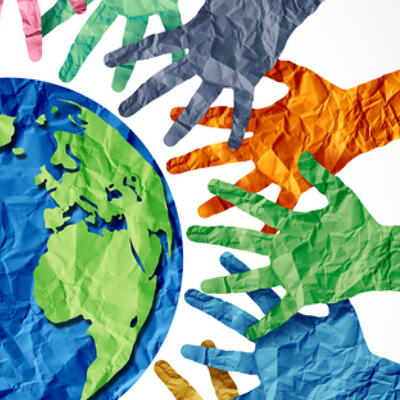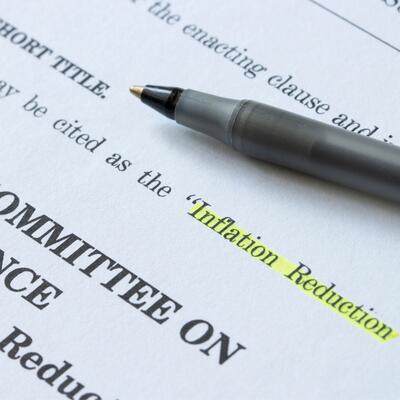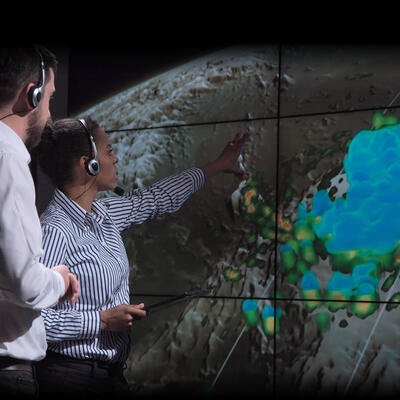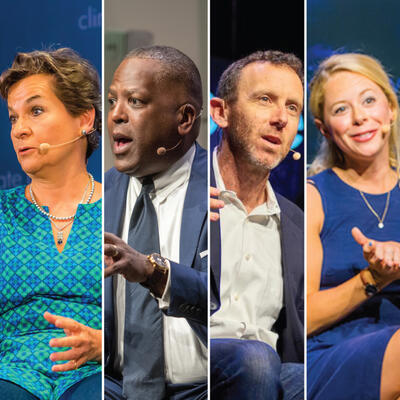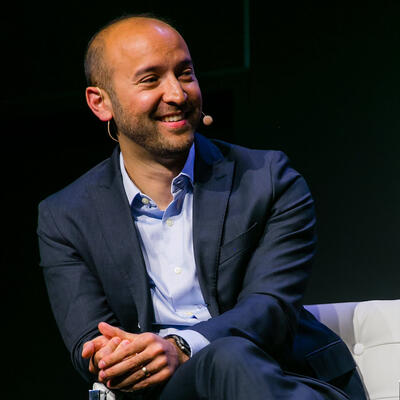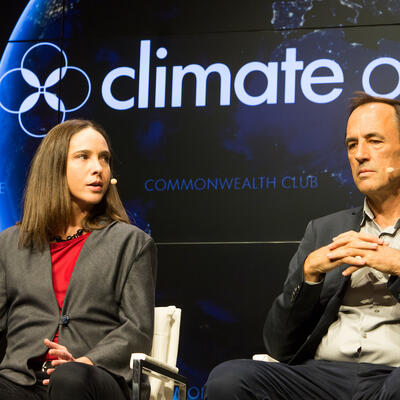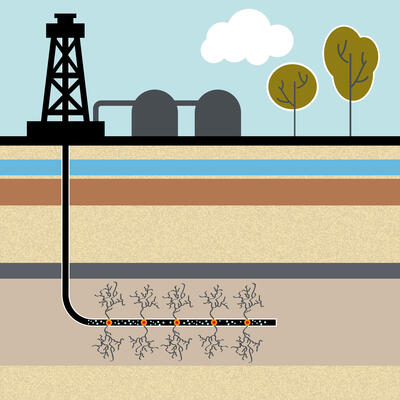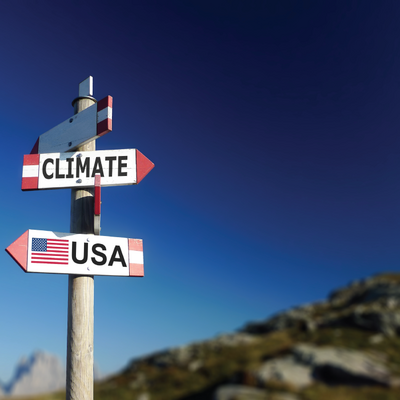
The Paris Agreement at Three: Floundering or Flourishing?
Guests
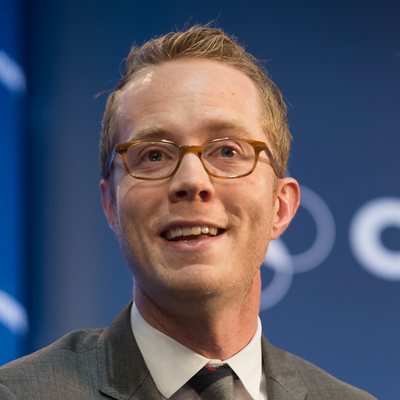
Trevor Houser
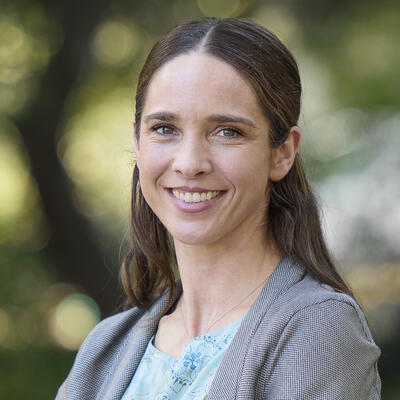
Katharine Mach
Summary
In its infancy, the Paris Agreement carried the promise of a truly global climate solution. Supporters still say the Agreement is the first step in setting the global economy toward a sustainable future, but U.N. reports now say current commitments are only a fraction as strong as they need to be, and critics say it's dangerously delusional to think the pact is ambitious enough to avoid catastrophic climate change. Katharine Mach, Senior Research Scientist at Stanford University, and Trevor Houser, Partner at the Rhodium Group, join host Greg Dalton for a Paris checkup, three years on.
Full Transcript
Announcer: This is Climate One, changing the conversation about energy, the economy, and the environment.
Katharine Mach: The Paris agreement was really an amazing moment in the climate challenge.
Announcer: Three years after it was signed, is the Paris Climate Accord flourishing or floundering?
Katharine Mach: Just about every country around the world we see progress grappling with the fact that climate change is here and now and not just the far-off aims towards long-term decarbonization of the economy.
Announcer: But are the demands of Paris enough to avoid further climate disruption?
Trevor Houser: The progress that we've already made in bending the emissions curve down has avoided just a massive amount of future human suffering. And the progress that is certainly within our reach is another large quantum of benefit that we shouldn’t abandon while continuing to work towards that one 1.5°, 2° target.
Announcer: The Paris Agreement, Three Years On. Up next on Climate One.
Announcer: Are supporters of the Paris Agreement still correct that it’s the first truly global step toward a sustainable future, or are critics right that the pact is not nearly ambitious enough? Climate One conversations – with oil companies and environmentalists, Republicans and Democrats – are recorded before a live audience, and hosted by Greg Dalton.
I’m Devon Strolovitch. The Paris Agreement was finalized on December 12, 2015.
Announcer: World leaders raised their arms in triumph as nearly every country in the world agreed that climate change is a problem, it’s caused by human activity, and it needs to be addressed. Three years later, is the deal flourishing or floundering?
Katharine Mach: I guess we’re ve made it through the terrible twos is one way of thinking about that question.
Announcer: Katharine Mach is Senior Research Scientist at Stanford University and an adjunct assistant professor at Carnegie Mellon University. She was also a co-leader of the IPCC working group on impacts, adaptation and vulnerability.
Katharine Mach: if 30 years from now we look back and say the Paris agreement was successful largely it will be because it has provided predictability to enable all of the other bottom-up action. But if you really wanna say are we doing enough, the answer hands down, still is no.
Announcer: So what happens if the world doesn’t meet its ambitious Paris commitments?
Trevor Houser: I think that there's a risk when we frame this as a binary challenge that either we get to 1.5° or we’re cooked.
Announcer: Trevor Houser is partner at the Rhodium Group where his team focuses on analyzing the economic risk of global climate change. He’s also served as a senior advisor at the U.S. State Department where he worked on the U.S.-China bilateral relations involving climate.
Trevor Houser: I think it's important to be honest about the limitations of what we’re doing currently. And I think it's also important to make it clear the benefits of the progress that we are taking.
Announcer: Let’s listen as Greg Dalton welcomes Trevor Houser and Katharine Mach to the Commonwealth Club stage for a conversation about the Paris Agreement, three years on.
Greg Dalton: Katharine Mach, let's go to that day, December 2015 in Paris the world was there. World leaders came together after -- failed in Copenhagen, they came together in Paris. What were your recollection how did you feel when that deal was sealed?
Katharine Mach: It was really an amazing moment in the climate challenge. It was one where from my scientific perspective a key underpinning was just a recognition that climate change is happening around the world every constant. There’s also the sense that solutions were possible, costs were dropping in terms of solar and wind and then the real backdrop was just the level of cooperation jumping back one year U.S. and China coming together with their joint announcements and just really everything else falling into place.
Greg Dalton: So it’s great, so it’s some optimism some cooperation. Trevor Houser, you were in Paris, but you're also were in Iowa advising Hillary Clinton, what’s your recollection of that moment?
Trevor Houser: I think I’d been in Paris the first week of the conference and then had to leave to come back to the states because of the U.S.-China joint announcement the year before. I think folks were pretty confident going into Paris that it would be a better outcome than Copenhagen had been several years before. But these are always, you know, 11th hour high wire acts. And I remember breathing a pretty big sigh of relief when that 11th hour came out while in Paris and that for the first time we had all countries save at that time, Syria and Nicaragua, and ultimately including Syria and Nicaragua agreeing to a common approach to addressing climate change and setting long-term goals and signaling pretty loudly to the world that we were all headed in that direction.
Greg Dalton: Katharine Mach, there’s a lot of talk the difference between 2° of Celsius and warming since postindustrial times and then there is this kind of surprising appearance of 1.5° that came into Paris, it was like wow this is kind of -- I remember being there and talking to Mike Brune, head of the Sierra Club he was pretty upbeat. He’s like yeah this is kind of like this is little better than we thought. So tell us the difference how that, A, how that came in and also the difference between 1.5° and 2°because it’s hard to understand what that really means.
Katharine Mach: Yeah, so to a really unprecedented degree science directly informed the goal setting around what should the limit be. And indeed we’re now pursuing a limit of well below 2°C and with 1.5°C in sight. So in some ways where that came from was first of all, a recognition of the degree to which climate change impacts are already happening. The last assessment out, the last full-blown assessment out from the intergovernmental panel on climate change came out in 2013 and 2014, and it was teasing out impact system by system. The frontline systems the coral reefs, Arctic sea ice is the degree to which we’re seeing impacts and extreme floods and fires. It’s also really the unevenness of those impacts for communities already on the margin whether that's food or water insecurity. So in terms of where 1.5°C came from, it’s really the fact that this is happening now and we know the risk go up and there are some really important thresholds. Whether it's sea level rise and the collapse of the West Antarctic Greenland or other questions that are more about ecosystems shifting into other states which really hard to get back.
Greg Dalton: And Trevor Houser, there’s sometimes sort of a binary idea that like 1.5 below everything is okay and above 1.5 there is, you know, there’s Armageddon but it's really more of a continuum, right, in terms of what happens between 1.5 and 2. So what are the economic risk of 1.5 and 2, you know, what are we really looking at on that continuum?
Trevor Houser: Yeah I mean I think that it’s, you know, 1.5° is a lot better than 2° and for some particularly vulnerable communities low-lying island states over a long period of time the difference between 1.5° and 2° can be existential. At the same time it's important as we focus on those long-term goals not to lose sight of the really enormous benefits in terms of risk reduction that we are delivering by reducing what was previously a trajectory of emissions of 6° or 7° down to 4°, 5° to 3°. Each one of those reduction in future warming is gonna save hundreds of millions of lives where on the world save billions of dollars in economic costs. And it’s important not to lose sight of that progress that we’re making along the way as we shoot towards that either 2° or 1.5° target.
Greg Dalton: Tell us about the architecture of the Paris deal it's voluntary doesn't have the, you know, it’s not a treaty it has not gone through the U.S. Senate it doesn’t have the effect of law. Where are the teeth what’s the structure of Paris?
Trevor Houser: So I think it’s important to realize that climate agreements are fundamentally different than almost any other kind of international agreement. If you negotiate an international trade agreement the implementation is really straightforward. You call your customs bureau when you get back from Geneva and you say lower the tariff rate and the customs bureau does that and it's done you've complied with the agreement. Likewise, nuclear disarmament agreements the implementation of that is really straightforward. Climate agreements to be successful, require not just the action of an unprecedented number of countries but the actions of millions of individuals within those countries, right, because reducing emissions requires action by companies by individuals by policymakers. And what was to me one of the most important pieces about the Paris agreement was every day you have whether it's people getting ready to go to college deciding what they want to study corporate planners figuring out how big of a priority sustainability is gonna be and they're looking for signaling. They’re looking for signaling from policymakers and from the international community of is climate a thing that global communities gonna get serious about addressing. And I think Paris sent that message in a way that no other international agreement had done on climate before. The actual compliance mechanisms in a climate agreement are name and shaming mostly. So in the negotiations all the way from Copenhagen up through the U.S.-China joint announcement one of the biggest sticking points, one of the biggest asks from the U.S. was to make sure that all countries that’s part of that international agreement robustly and independently report on their progress and their plans so that the international community could look at that and see whether it was adequate and whether we’re going far enough. Little did we know when we are negotiating that, that those transparency provisions would be very quickly applied to the U.S. to see how far we were doing or falling short, rather, in meeting our commitments.
Greg Dalton: Trevor Houser, tell us the China-U.S. back story because it’s really important. One thing that was very different in Paris was U.S. and China were kind of together in terms of they had a bilateral agreement whereas in Copenhagen they were not on the same page, the big, you know, after decades of climate diplomacy that was a big breakthrough. So tell us about the U.S.-China bilateral back story, particularly Obama and Xi Jinping around the APEC summit.
Trevor Houser: This is when Obama first became president, expectations were extremely high that with this new Democratic president who had campaigned on a commitment to climate change that a new international agreement would be possible. But there was this long-standing division between developed countries and developing countries and between large developing countries like China in particular and the U.S. that they should be treated categorically different as part of an international agreement. That the categories that countries have been put in in 1992 should never evolve no matter how affluent those countries became. And the U.S.’s view was that China and the U.S. should be doing different things because they are at different levels of development. But everybody needs to be doing something and we all need to be under a common agreement. That became an un-reconcilable difference and was largely what caused the Copenhagen conference to break down. By 2014 the U.S. and China had figured out a way to bridge that agreement through a bilateral announcement between President Obama President Xi Jinping. And that core agreement between the U.S. and China on having a common structure that both developed and developing countries were part of is what helped to make the Paris agreement more successful.
Greg Dalton: So Katharine Mach, is Paris healthy at three years old or is it a little sickly child?
Katharine Mach: I guess we’ve made it to the terrible twos it is one way of thinking about that question. I mean I think the world does look different in year 2018 as compared to 2015. I think hands down in the space of climate change impacts we’re just increasingly understanding that this is something we need to grapple with not just in terms of reducing our emissions of heat trapping gases but in preparing for increased precipitation when a cyclone strike shore, increase risk of fire, that dimension is part of the Paris agreement but I feel like it’s something that we're seeing more and more. The Paris agreement in some ways kind of has this top-down, bottom-up relationship. And I think if we look at the world around us right now indeed, the Paris agreement has every single country at the table and it provides a signal if 30 years from now we look back and say the Paris agreement with successful largely will be because it has provided predictability to enable all of the other bottom-up action. So in the world around us right now when we say is the Paris agreement healthy, part of that is the fact that cities are coming together with pledges, states are coming together with pledges at the same time that you have private-sector action unleashing innovation. But if you really wanna say are we doing enough, the answer hands down, still is no. And we see that in a lot of different ways emissions at the global scale, we had three years there from 2014 to 2016 where they were remarkably flat, while the economy was growing. This year they've tick back up, U.S. is this year looking like emissions again will tick back up so we have increasing impacts a lot of progress in the space of solutions but still a real need to go faster and bigger.
Greg Dalton: Trevor Houser how about the impact of change in U.S. leadership. You've been in the diplomatic circles the change of U.S. president who particularly in his second term made climate somewhat of a legacy issue, Trevor Houser, what has been the change of the U.S. president probably doesn't mention climate in the top three issues when he was going to a foreign country these days?
Trevor Houser: Yeah, I think it's pretty hard to overstate the impact of that change in U.S. leadership. I mean there has been following Donald Trump’s election and his announcement of the U.S. intention to pull out of the Paris agreement as Katharine said there's been this kind of groundswell of state and city action in the U.S. trying to do their part to help keep the U.S. on track. That's helpful, but it's far from sufficient. I think the thing that people didn’t see about the Obama administration in public and that really is lacking now is in almost every head of state meeting that President Obama had he made climate change one of the top three discussion points. And the leaders that he was meeting with knew that he was gonna make climate change one of the top three discussion points. And if you are the president of Bangladesh or Chile or Germany and you're meeting with the U.S. head of state and you know he’s gonna ask you about what climate policy you're taking, that drives domestic policy focus in a way that few other things can and that’s completely gone now. I mean if anything, the opposite is true that the current president creates a moral hazard opportunity for other leaders to backslide. And I think that's there's really no other country that can play that role in the way the U.S. can.
Announcer: You’re listening to a Climate One conversation about the Paris Agreement, three years on. Coming up, Greg Dalton asks about keeping countries on track to meet their Paris commitments.
Katharine Mach: For this agreement to have teeth that means there’s a system of peer review that can happen. So when countries say every five years here’s what I’m gonna do now, here’s what I’m gonna do now can we actually tell how far and how fast they’re moving towards that in a really vigorous way.
Announcer: That’s up next, when Climate One continues.
Announcer: We continue now with Climate One. Greg Dalton is taking the pulse of the three-year old Paris Agreement with Katharine Mach, Senior Research Scientist at Stanford University and Trevor Houser, partner in the Rhodium Group, an energy research firm.
Here’s your host, Greg Dalton.
Greg Dalton: Katharine Mach, what are some interesting scientific breakthroughs understandings in 2018. Like do we really understood either the impacts or the causes how this happening what’s some of the new exciting science?
Katharine Mach: There's been a lot of attention to extremes and maybe that's one place to start. I think something that's been really interesting is again and again we’re seeing climate change happening right in front of us and often times we’re seeing little surprises thus making this a harder challenge to grapple with then we could have guess based on what has happened in the past. So for example we’ve had this unending series of hurricane striking shore whether it's Harvey, Maria, Florence, Michael. And some of the surprises there have been just how much rain is falling with these large storms staying still and dumping so much water into urban environments that we've paved over and that are not absorbing that water. So in terms of the advancing science increasingly the models can tease out all of these different ways that we are adding to different ingredients of risk in driving up those kinds of impacts. Same thing goes for fire where we used to think fire indeed is complex it has to do with how we have chosen to suppress fires through time in a way that increases the risk, but now truly a question of well what’s happening with night time temperatures as the fire die down. Just how long is the fire season how much intensity of energy is there right in a time where you’re most likely to get impacts. So there are a lot of features there where we’re seeing that sharp end of the climate system and extremes and the science is really catching up to what we’re seeing unfolding in the world around us.
Greg Dalton: Let’s talk about fires. I think fires were really a breakthrough moment, Trevor Houser, I’ve gazed at climate darkness for 10 years and I didn't really see nearly 2 weeks where people were putting wearing masks around the San Francisco Bay Area and putting your mask on a child to go to school. I’ve heard the forest fires but it really was kind of breathing it into our bodies I thought we kind of internalize it in a way that I honestly didn't anticipate. I’d like to have your thought on the fires as a risk as an economic story really is a breakthrough story for me of 2018.
Trevor Houser: One of my first jobs in government was at the Embassy in Beijing. I had to write the air-quality cable which was reporting on local air-quality and this was in 2005 and at that time the air-quality cable is what determine the hardship pay for U.S. Foreign Service officers in Beijing. And they got about 25% premium and pay for breathing air in Beijing which was the same premium as people working in the Green zone in Baghdad got at that point. And, you know, and the two weeks we had here were like a medium bad couple weeks in China. But there was something about having it happen here where I not used to breathing particular matter at that level to have to like put masks on my kids when I was dropping off at school every day. That really brought the like health consequences that air pollution home and I think it did for a lot of other people too. I mean we had, there were 15 million Californians every two weeks were breathing air three or four times the EPA minimum thresholds for particulate matter. And the fact that that smoke from the car fire in particular just sat in the Central Valley in the Bay Area for two weeks I think really was a wake-up call for a lot of people.
Greg Dalton: And Katharine Mach that gets to some of the social sciences called the human impact. Climate started as chemistry and physics literally in outer space and it’s kind of these complex systems. But the fires and I know the work you've done with the IPCC is on human the impacts, what role are the social science is playing in this, you know, sociology, psychology, learning about the human responses and the human adaptation rather than the ecosystem the globe.
Katharine Mach: Yeah, so a lot of the rapidly advancing science is really been in the space of how climate change affects people on the impact side. How people are perceiving the risk and how they feel about it and then also, just how policy is unfolding. So to run with one of those examples, migration. How will people be on the move in a changing climate is a really rich area. On one hand you can say, well, one way or another people will be on the move. We know in the aftermath of a disaster for example, there's often displacement whether it's Katrina or Maria and the real question is how might those flows change into the future. But there are also will be more managed flows for example something that has been happening even in some communities in the U.S. already in the last two years is that people may say, you know, I shouldn't have lived here in the first place and they may elect to move and the real questions of how property markets will unfold. And then even from the direct policy side of this perception of people saying it's not safe I want out, there's often a need for government to intervene. And so that full-spectrum of kind of impacts of displacement through to the direct involvement of governments in helping entire communities relocate or individual household is something that's totally happening in the world around us right now.
Greg Dalton: And Trevor Houser, you’ve been involve or some researchers, collaborators who’ve looked at the winners and losers in terms of regions in the United States, perhaps regions in the world. So tell us about regions that might be better off in a warmer climate. What are the reasons and who’s gonna be the winners and the losers?
Trevor Houser: Yeah, I mean I think one of the really profound pieces of insight that we’re getting in this impact research I’m sure that Katharine and her colleagues at Woodholes get to is that the impact of climate change really varies dramatically based on where you live and what the climate is like. And we often talk about climate impacts in the economics community and these kind of aggregate terms percent of GDP or hundreds of billions of dollars. That really masks a lot of variety and how it impacts individual people. So in the U.S. for example, a change in the number of extremely hot days each year could lead to a dramatic increase in death rates in South Florida and a dramatic decrease in death rates in the north. I grew up Wyoming very few people die of heat-related stress in Wyoming. Lots of people pass out drunk in snowbanks and, you know, and a changing climate fewer snowbanks in Wyoming will mean less deaths on average and it'll mean significantly more heat-related mortality in other parts of the country. And it's really important to kind of tease out those big average numbers to understand how those impacts are gonna vary.
Greg Dalton: And is it safe to say that wherever you live now the warmer it is the higher your risk is gonna go. If you live in a cold place you're gonna see perhaps some improvement. If you live in a hot place it's going to get worse, is that fair to say Katharine?
Katharine Mach: Yes and no. So I think we have clear evidence that when it comes to economic impacts if you're really hot and you get hotter it's not looking that great, Norway might fare well. But there's some sharp limits on that and it really gets to what happens when you move away from temperature as the hazard under consideration. So for example, basic idea if you run with that logic that colder and colder and colder your economy is gonna get better and better and better but then as we step up to the Arctic actually we see massive climate change happening in the Arctic where when that ice thaws now that water is dark absorbs a lot of heat. You’ve got the ground that was once frozen, not only in Wyoming but also in Fairbanks, Alaska and as that melts whatever was there as your infrastructure is now sagging. So for example, there are a series of indigenous villages in Alaska where they are basically collapsing into the water as the sea ice is melting waves are striking shore the permafrost is thawing. And in many cases the U.S. government picked the locations of those villages and mandated settlement there but these people are now trying to get out and they haven't been able to do so.
Greg Dalton: If you’re just joining us our guests today at Climate One are Katharine Mach, Senior Research Scientist at Stanford University and Trevor Houser, partner in the Rhodium Group, an energy research firm. I'm Greg Dalton. We’re gonna go to our lightning round where we ask our guests true or false questions. Starting with Trevor Houser. True or false. In your lifetime, a Trump hotel will be built in the Arctic to serve passengers on cruise ships plying the fabled Northwest Passage that is navigable for the first time due to melting sea ice?
Trevor Houser: False.
Greg Dalton: Katharine Mach, if it were built, Vladimir Putin would have the penthouse suite?
[Laughter]
Katharine Mach: True.
Greg Dalton: Trevor Houser, 10 years ago there was broad industry and some public support for climate legislation in the United States. President Obama could have pushed a bill through Congress if he really tried. True or false?
Trevor Houser: False.
Greg Dalton: Katharine Mach, it's often challenging being a woman working with some of the men who dominate the world's leading scientific institutions.
Katharine Mach: True.
Greg Dalton: Trevor Houser. True or false. You have contemplated a refuge where you could move your family if the destabilize climate leads to broad civil unrest?
Trevor Houser: Repeatedly.
Greg Dalton: Me too. True or false. There is no haven?
Trevor Houser: False.
Greg Dalton: Katharine Mach, science is pointing to climate disruption worse than your liberal friends realize?
Katharine Mach: True.
Greg Dalton: True or false. Trevor Houser, Wall Street will figure out how to make boatloads of money off the volatility in financial and property markets due to a disrupted climate?
Trevor Houser: True.
Greg Dalton: True or false. Trevor, you grew up in Wyoming and attended schools financed by oil and gas extraction revenue?
Trevor Houser: True.
Greg Dalton: This is association. I'm gonna mention something you’re just gonna mention the first thing that pops into your mind completely irresponsibly and unfiltered. Katharine Mach. Clean coal.
Katharine Mach: Doesn't exist.
Greg Dalton: Trevor Houser. Carbon capture and storage.
Trevor Houser: Important.
Greg Dalton: Katharine Mach. Insurance companies.
Katharine Mach: One year time horizon.
Greg Dalton: Last one. Trevor Houser. What comes to mind when someone says Rick Perry, U.S. Secretary of Energy.
Trevor Houser: Hilarious.
Greg Dalton: Alright. Let’s give them a round of applause for getting through that.
Trevor Houser, there's some suggestion that there's a recent climate conference going on in Poland negotiations, there’s some suggestion that the U.S. is going from kind of benign neglect where President Trump would Tweet some nasty things say some dismissive things, but the engine of government would kind of be there and sort of supportive without getting in trouble. But there’s some suggestion that there is now U.S. is actively trying to stick a dagger into the Paris climate accord, what’s your take?
Trevor Houser: So the highest stakes drama going on in Poland right now is the drama that's not getting reported in the press. So all the theatrics around whether the international community would welcome or take note of the U.N. report is important, but not the thing that matters most out of the outcome. What's high-stakes is what's happening behind closed doors in very technical negotiations around the framework architecture of the agreement. And I have what’s hopefully not poorly founded optimism that the career civil servants at the State Department are doing their best to protect a framework there that will survive the current administration.
Greg Dalton: So that is kind of do some things that are kind of boring and out of the radar of the political level people that will preserve credibility and the mechanism until the day after the 2020 election which is the first day that U.S. can formally officially pull out, right. Kind of keep it alive on life support for two more years.
Trevor Houser: Yup.
Greg Dalton: Katharine Mach, your take on whether the U.S. is moving toward more active opposition that it has been.
Katharine Mach: I mean I think what Trevor is getting at is historically the role of the U.S. in international climate negotiations has been to push for really regress binding agreements that essentially are good in terms of countries doing a thorough job in reporting their emissions of heat trapping gases. Making sure that everyone can have high confidence that those data and numbers are right. And that there's a lot of transparency that China understands what the U.S. is doing, understands what Brazil is doing, etc. So I think kind of the interesting thing moving forward is actually for this agreement to have teeth. What does that mean, it means that there’s a system of peer review that can happen. So when countries say every five years here’s what I’m gonna do now, here’s what I’m gonna do now can we actually tell how far and how fast they’re moving towards that in a really vigorous way. And so I think that's essentially all the career diplomats there working hard on the small rooms through the night on this agreement are pushing for a rulebook that will make this an effective agreement moving forward.
Greg Dalton: Trevor Houser, there is a change obviously in domestic politics it was the clean power plan and CAFE standards coming out of the great recession that really were the pillars for the U.S. having credibility going into Paris. How does this new resurgence of a Green New Deal, the carbon legislation being introduced in the house how does that play into this equation of the U.S. leadership and Paris?
Trevor Houser: Yeah, I think the U.S. unfortunately climate has become an extremely partisan issue that wasn't the case a decade ago, but it's now one of the most partisan issues in American politics.
Greg Dalton: John McCain and Barack Obama had the same position basically.
Trevor Houser: Both supported cap and trade had different views about what to do with the allowances. I mean if you go back and read the 2008 Republican Party platform and Democratic Party platform on climate they're not that different if you compare the 2016 party platforms they are diametrically opposed. We focus a lot in the Republican Party challenge with climate which is because of primary politics and sources of campaign funding on the Republican side. It's very difficult for Republicans to even talk about climate in a meaningful way. But there’s a problem on the Democratic side too which is that for most Democratic voters and for the Democratic politicians who represent them it’s still a relatively third tier priority. What's most exciting to me about what we’re seeing happening in the freshman Democratic class in the house is not so much any particular policy proposal or the kind of parameters of a potential green new deal. But the fact that this incoming class of freshman congressmen with a lot of energy and enthusiasm with them have decided to stake out climate as a priority issue. I think that bodes well for how much priority it will get within the Democratic Party going forward.
Greg Dalton: But obviously this is going to go nowhere in the Senate. People are getting very excited climate people are very excited there's a bill introduced well lots of bills are introduced in Congress that never go anywhere they just so they can go back and talk about them and I introduced a bill. So Trevor Houser, obviously this legislation it might feel good it's exciting but maybe it's a longer game. This is really about 2020 and it's not gonna get obviously Trump is not gonna sign it, it’s not gonna get through the Senate. So where does this go what's the calculation just like hey, we’re introducing climate bills it feels good.
Trevor Houser: Yeah, there's a lot of. If you were a Democratic Congress that had designs on passing legislation in 2021 or 2022, you wouldn't want to be in the position that the Republicans were when they took back power with something like ACA repeal where they had seven years to figure it out and they had no game plan within their own caucus, right. So I think that there's a lot of groundwork. There's a lot of groundwork that was laid for Waxman-Markey there’s a lot of groundwork that’ll need to be laid for any future legislation. And it appears that now there's some energy for the new Democratic house leadership too, I prioritize that as an issue.
Greg Dalton: Katharine Mach, some of the strongest social science research data we have is what happens when people get hotter than usual. Tell us about the correlation between heat and conflict.
Katharine Mach: Great. So one of the pretty impressive breakthroughs over the last decade has been teasing out what happens in a hot year or dry year. And these human impacts that let’s just say today had never been connected to a changing climate. And so what we see is a really strong signal that if it is hotter than average you get more violence across social scales and that really plays out in terms of domestic violence and suicide all the way through to large-scale violence, organize violence within countries call it Civil War. The really important caveat you need to insert there though is that when we say, well why is war happening in the world right now, it's not because of climate. That would not be on the top of your list, right. The top of your list is how is the government functioning are you in a postcolonial area where that government is really still building up, what's the economy like what is the nature of inequality as it draw in societies. So when you think about war, you need to start with those major drivers but with those major drivers on the table you do still see amplification of risk from climate. I think that's kind of the key feature of this climate challenge is that no one maybe except for the three of us will wake up in the morning and think about climate first thing but climate intersects with just about everything else that people care about.
Announcer: You're listening to a conversation about the Paris Climate Accord, three years on. This is Climate One. Coming up, Greg Dalton asks about the changing political reality of advancing climate solutions in the U.S.
Katharine Mach: There's an amazing statement from one of the political incoming leaders in Florida recently saying, I’m not a climate change guy but we've got a sea level rise problem.
Announcer: That’s up next, when Climate One continues.
Announcer: You’re listening to Climate One. Greg Dalton is talking about the Paris Agreement at three with Katharine Mach, Senior Research Scientist at Stanford University and Trevor Houser, partner in the Rhodium Group, an energy research firm.
Here’s Greg.
Greg Dalton: Trevor Houser, you've talked to a gentleman in Gillette, Wyoming, who basically makes seems like shovels for heavy equipment. Tell us what he said about climate and perhaps positioning for, you know, this changing economy.
Trevor Houser: Local politics in Wyoming are pretty different than what you would guess if you listen to the national delegation from Wyoming. And it’s a state that’s largest coal producer in the country, mines almost half of the country’s coal where coal oil and gas extraction revenue is the largest source of tax revenue for the state. But, you know, if you're a local politician in Wyoming, you know, you have very little ability to control what happens outside of your state and that effective policymaking requires like trying to read tea leaves. And that sentiment I think was best summed up as you mentioned by an equipment manufacturer in Gillette who makes shovels for Powder River Basin mining who said a couple years ago when I was meeting with him that he hasn’t impersonally believe in climate change but if the Pope does then world is probably gonna do something about it and he needs to start positioning his company to get ready. And I think you find that same level of pragmatism on the ground in a lot of fossil producing communities of, you know, independent of their views about this issue. They want to know what the future looks like and want to start putting in place a plan to make sure that their communities can transition.
Greg Dalton: So someone who makes shovels to get coal out of the ground might be thinking about, yeah, what's after coal. Katharine Mach, you spent some time in Florida recently where you didn't use the C word but you were able to talk about the impacts of climate. So tell us how that kind of a coded language there in Florida.
Katharine Mach: Yeah, there's an amazing statement from one of the political incoming leader in Florida recently saying, I’m not a climate change guy but we've got a sea level rise problem, right. So I think there are so many places in the U.S. where there's recognition that the impacts are here and now and flooding damages fire damages in the U.S. from all those types of weather and climate extremes added up to $300 billion in losses last year. That's a phenomenal amount of damage being brought on the economy and also in terms of lives of people in individual locations. And so I think in so many different places, you see people talking about wind because it's profitable and it’s a way to build an economy. Look at Texas or Iowa for example and you see people grappling with the impacts where they matter now whether or not they're calling it climate change. And if you really want your synonyms look out for environmental change or weather or lots of other preparing for something that just don't put climate and change together in one stock phrase.
Greg Dalton: Trevor Houser, we haven't talked much about -- I can't wrap up our conversation about Paris without talking about the moral dimension of what the responsibility of, what is it 30% of historic greenhouse gas emissions, you know, comes from America. So let's talk about the moral responsibility the people who contributed most are suffering first and worst. I wanna address the moral dimension of Paris.
Trevor Houser: Yeah, I think there's two pieces of that. One is as a country that developed during a period where we weren’t thinking about climate change we have a responsibility to those countries who haven’t developed during a period where climate is a concern and that also just recognizing that when we look at the impacts research that Katharine does that our colleagues do it's really the poorest people on the planet that are gonna be most heavily impacted like with many issues. From the changes in the climate that are already occurring let alone the changes in the climate that will happen if we don't reduce emissions. And so, you know, I think we as a country have a moral obligation to lead on this issue both in mitigation and in helping protect those most vulnerable countries. But we as individuals do, I mean, we need to recognize that every time I make a decision to fly for vacation instead of staying at home I am putting greenhouse gas emissions in the atmosphere and that's having an impact a real measurable impact on the lives and health of people around the world. And, you know, while the actions each of us take individually are relatively small it is also the case that there's no solution to this problem that doesn't include actions by all of us. And I think it's important not to get disconnected from that personal responsibility.
Greg Dalton: Do you feel guilty and do you buy offsets?
Trevor Houser: I feel guilty and I buy offsets, yes. And the offsets do not do much to placate the guilt.
Greg Dalton: Katharine Mach, do you feel guilty for your personal carbon footprint and do you try to offset it in some way?
Katharine Mach: Yes, I do but I think I also understand that we as individuals are in this interconnected system. So we need to take agency in our own lives how we invest how we live. I bike, I don’t eat too much red meat, etc. etc. but to really make progress big enough fast enough it’s got to be all of those different levers being pulled at the same time.
Greg Dalton: We’re gonna go to your audience questions. Welcome to Climate One.
Male Participant: Hi. I'm wondering how you could -- when you’re talking just amongst yourselves what do you fear the most where the Paris Accords at 3.3°C that’s what if everyone made their commitments that’s what would be and no one is -- very few people are making their commitments. We expect 4° or 5°C by the end of the century. What does that disaster do for civilization?
Katharine Mach: Great. So I mean I guess in some ways you're highlighting the heart of this issue. So we have the first universal climate treaty with every single country on board. It's an amazing moment and collaboration on this issue. At the same time we’re far from good enough, right in terms of the world as it exists right now and the world that would limit warming to 1.5°C, they’re radically different. We can't even fathom that we would feasibly limit warming to that type of level. I think the real question moving forward is how do we amp up ambition on this issue. A lot of it will come down to fairness keeping everyone at the table recognizing that those of us who are the biggest emitters historically have a responsibility on this issue for the small islands for the people here in California who are most affected and most vulnerable to the impact socially as well as what's happening in the environment. It’s really recognizing that we’re gonna need to take a lot of steps forward recognizing that some of those will make profits and move fast once they get into place whereas others, airline travel, for example, or cement and steel we don't yet have the solutions in our toolkit. So all of those pieces absolutely need to come together and I think your point is exactly right. It's got to be a lot faster at the same time that we've got many features to work from in the world as it exist right now.
Greg Dalton: Katharine Mach, embedded in that question was something imply that is that people who talk about climate sugarcoat it even us who talk about these heavy consequences don't fully say how dark and serious the math is. I hear this sometimes when people who say politician sign deals that make them feel good that they know aren’t gonna really get the job done corporations make pledges they know that look good sound good maybe sincerely feel good but they're not gonna get the job done. Is there some, you know, people often talk about denial on the right like it's not exist. Is there also denial light among people who are working on climate that somehow think they're solving it when realistically we’re not?
Katharine Mach: I mean I think in that question is what is the nature of risk in a changing climate and it is severe widespread pervasive and there are features that will be irreversible. And that’s something that the science has been piling up over the last 20 plus years in incredibly massive way. I think first of all, there's the category of systems most affected in a changing climate, we had a major bleaching in the Great Barrier Reef two years in a row that’s the first time that’s ever happened in the history of what we've got recorded. It’s in the space of extremes we’re now, we’re teasing out those impacts event by event. It’s in the space of the unfairness factor of a changing climate for populations most vulnerable within anyone country and across countries. And I think one that is hard to talk about it’s the tipping points where we can't say exactly when we’ll commit to the irreversible loss of large portions of the West Antarctic. We know they are there those types of tipping points based on what has happened between glacial and interglacial cycles back in the far reaches of Earth’s history. But we don't know exactly how fast those can be accelerated even though it’s a very active area of research and we don't know because it’s so fundamentally beyond what’s happened before that we've experienced and measured. So I think there’s real understanding of those risks at the same time that it’s a complicated landscape. So when we, as scientists talk about this what’s reported in the headlines is, you know, IPCC says the world is gonna end in 12 years, that’s helpful and unhelpful in the same way. And I think that same sort of progress needs to be made in talking about how we see solutions and also how we see pragmatic fast-forwards making even more progress.
Greg Dalton: Trevor Houser, do you think it’s possible as being too honest that we should kind of not tell people how bad it is because we’ll feel bad and they’ll feel paralyzed?
Trevor Houser: I think it's important to be honest about the limitations of what we’re doing currently. And I think it's also important to make it clear the benefits of the progress that we are taking, right. So I think that there's a risk when we frame this as a binary challenge that either we get to 1.5° or we’re cooked. That there’s a risk that people respond to that if 1.5° looks impossible the people will respond and say, well, why even bother because clearly that's not possible. And it’ll be really unfortunate if that was the reaction that we had as a community because the progress that we've already made in bending the emissions curve down has avoided just a massive amount of future human suffering. And the progress that is certainly within our reach is another large quantum of benefit that we shouldn’t abandon while continuing to work towards that one 1.5°, 2° target.
Greg Dalton: I liken the Paris agreement to someone who comes up and says, hey I lost 30 pounds and you say, you know they need to lose a hundred but you say, great that's great keep going, right. You’re not there yet but you started. Let’s go to our next question. Welcome.
Greg Dalton: Let’s go to our next question. Welcome.
Male Participant: Thank you. It's pretty simple question for both of you. So if you are king of the world and you are queen of the world and you have complete power to do whatever you wanted at the same time the people were happy to they didn’t come with pitchforks and axes to take you down. What would you do?
Greg Dalton: Queen first.
Katharine Mach: Alright. So it’s a big question. I think I’ll take one broad angle there is, you know, what’s the role of government first of all, right. And I think government has a mandate in many ways to ensure the well-being of people in anyone country to make sure the vital core of human life is protected. There's also a question of equity, right, embedded in what government is supposed to achieve. Why is that important, well, oftentimes the powerful can take charge of a system and I guess if I’m a queen, gonna assume I’m a benevolent queen, there’s also a feature of government where we say shouldn’t investments that government makes be cost-effective not wasting money. So from any of those perspectives keeping people safe, ensuring equity and doing what is in the best economic interest of a country as queen I'd be helping societies respond to a changing climate. Change is so complex, but if you want to just simplify it, it’s so many ways just the technology problem we can get to, you know, maybe 80% emissions reductions with technologies that already exists. There needs to be a fair and just transition for the economies of the past as they transition into the economies of the future. But this is something that we have done again and again and again, we know how to create new technologies and deploy them. Then there also needs to be the collaboration across countries to really deploy that broad lane. And then the final thing I’d be doing to keep people safe in an equitable way is really making sure we are addressing the impacts that are unfolding and that is hard. I guess if I had all power I could shape how market forces work and also how individual communities harden their homes so that they are resistant to fire. But that perspective I’ve really grappling with the rest they’re unfolding right now would also need to be part of the equation.
Greg Dalton: And the king.
Trevor Houser: Alright. Okay, so four things. I’d set a date certain when utilities could no longer sell any electricity generated with carbon dioxide emissions. And I provide a significant slog of investment to help them get there. I’d set a date certain when auto manufacturers could no longer sell internal combustion engine vehicles and provide a slog of investment to help them retool facilities and help market that next generation of electric crossover vehicles to buyers. I would set a standard for the carbon emissions in steel and cement and slap a massive tariff on imports of steel and cement from other countries that didn't meet that standard. And then finally I would set up a massive national research institute that was solely focused on growing lab grown meat and dairy products that are indistinguishable when I pick up my hamburger and then I would buy a shotgun for when my cattle ranching uncle comes to kill me to keep him off my property.
Greg Dalton: Wait till hear this in Wyoming, okay. Welcome to Climate One.
Female Participant: Okay. My question, a bit of an advice I guess question for small islands. So you said from the perspective of some of the large more emitting countries like the U.S. there's some kind of a sense of moral responsibility. But from the small islands perspective do you think that there is a way to sink our teeth into the decision-making that goes on in some of the bigger countries or are we really just subjected to, you know, more on the adaptation side. Do you have any advice for the more vulnerable communities at the forefront of like do we have power to and change on a more global scale I guess.
Trevor Houser: I would say, so I think it is the political power that small island states are able to have in this process is really large. So in Copenhagen, one of the things that happened that I think made President Obama prioritize climate in his second term was conversations that he had directly with the leaders of small island states. Now President Obama grew up in the islands he’s from Hawaii so he had kind of a personal connection there in a way that not all leaders do. But that same kind of moral clarity and existential threat was what made the inclusion 1.5° in the Paris agreement possible. It was an alliance between small island states and developed countries that wanted to take a more aggressive approach to climate that got that included. And I think there is really no substitute for that constant clarion call that's coming from small island states to remind the rest of us for whom this can we have the luxury for this to be a tomorrow issue to that this is a here and now and an existential issue for millions of people around the world.
Greg Dalton: One of my all-time favorite documentaries I see a lot of them is Island President. If you haven't seen that it’s still very valid that the president of the Maldives his story was very compelling it's one of the best I think climate documentaries that’s ever been made it’s still very relevant. The Island President. Before we wrap up, I wanna ask Trevor Houser, we haven't talked climate leadership President Macron, Prime Minister Trudeau, what have you learn from the headwinds that they're tackling that, you know, the yellow vest protest in Paris. Doesn't that give pause to any political leader about tackling climate change for the political backlash they may face?
Trevor Houser: Yes, so I think it's important not to over read from a climate lens what's going on in Paris right now. I mean the fuel tax protest where, you know, fuel taxes were catalysts, but it is really a broader protest against Macron’s economic restructuring policy.
Greg Dalton: Reducing taxes on the wealthy all sorts of things.
Trevor Houser: Right. I mean Macron is attempting to push one of the most ambitious labor market reform programs in modern French history and there are a lot of people who are extremely upset about that. I mean just this context, if you look at the impact of the now delayed French gas tax increase on household disposable income, there were a dozen states in the U.S. who over the past two years have passed gas tax increase is higher than that including liberal bastions like South Carolina and Georgia and Montana. And so it's not that $.12 per gallon gas tax increase in France that was the cause of all of that outrage like it was a catalyst. Now it’s an important cautionary tale of how the distributional impacts of climate policy really important to keep in mind, but there were a lot of hot takes over the past couple weeks about how protests in France over a $.12 per gallon gas tax increase is a sign that no one should try carbon pricing anywhere in the world. And I think that's probably an over read of different situation.
Announcer: Greg Dalton has been talking about the Paris Climate Accord, three years on, with Trevor Houser, partner at the Rhodium Group, an energy research firm, and Katharine Mach, Senior Research Scientist at Stanford University and a co-leader of the IPCC working group on impacts, adaptation and vulnerability.
To hear all our Climate One conversations, subscribe to our podcast at our website: climateone.org, where you’ll also find photos, video clips and more. If you like the program, please let us know by writing a review on iTunes, or wherever you get your podcasts. And join us next time for another conversation about energy, the economy, and the environment.
Greg Dalton: Climate One is a special project of The Commonwealth Club of California. Kelli Pennington directs our audience engagement. Tyler Reed is our producer. The audio engineers are Mark Kirchner and Justin Norton. Anny Celsi and Devon Strolovitch edit the show. I’m Greg Dalton, the executive producer and host. The Commonwealth Club CEO is Dr. Gloria Duffy.
Climate One is presented in association with KQED Public Radio.
